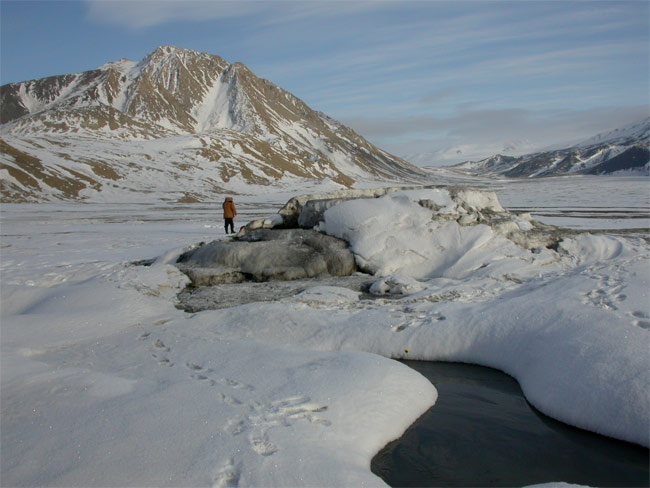Extreme Life on Earth Could Survive on Mars, Too

A new discovery of bacterial life in a Martian-likeenvironment on Earth suggests our neighboring red planet could also behospitable to some form of microbial life.
Researchers found methane-eating bacteria that appear to bethriving in a unique spring called Lost Hammer on Axel Heiberg Island in theextreme north of Canada.
This spring is similar to possible past or present springson Mars, the scientists say, so it hints that microbiallife could potentially exist there, too. There is nofirm evidence that Mars does or ever did host life, however.
The Lost Hammer spring is extremely salty ? so much so thatthe water doesn't freeze, even though temperatures are below freezing. Thewater has no consumable oxygen in it, but there are big bubbles of methane thatrise to the surface.
And yet, the researchers found unique anaerobicorganisms ? creatures that don't need oxygen to survive ? thriving in thespring. The hardy organisms most likely breathe sulfate instead of oxygen, theresearchers said.
"The Lost Hammer spring is the most extreme subzero andsalty environment we?ve found," said researcher Lyle Whyte, amicrobiologist Canada's McGill University.
In fact, the temperatures in this part of Canada are evenharsher than those found in many places on Mars.
Get the Space.com Newsletter
Breaking space news, the latest updates on rocket launches, skywatching events and more!
"There are places on Mars where the temperature reachesrelatively warm -10 to 0 degrees and perhaps even above 0?C," Whyte said,"and on Axel Heiberg it gets down to -50, easy."
And recent data suggests Mars also has methaneand frozen water.
?If you have a situation where you have very cold saltywater, it could potentially support a microbial community, even in that extremeharsh environment.?
The discovery is detailed in the International Society for Microbial Ecology Journal.
- Ten Alien Encounters Debunked
- Wild Things: The Most Extreme Creatures
- Images: Alien Life of the Antarctic
Join our Space Forums to keep talking space on the latest missions, night sky and more! And if you have a news tip, correction or comment, let us know at: community@space.com.

Space.com is the premier source of space exploration, innovation and astronomy news, chronicling (and celebrating) humanity's ongoing expansion across the final frontier. Originally founded in 1999, Space.com is, and always has been, the passion of writers and editors who are space fans and also trained journalists. Our current news team consists of Editor-in-Chief Tariq Malik; Editor Hanneke Weitering, Senior Space Writer Mike Wall; Senior Writer Meghan Bartels; Senior Writer Chelsea Gohd, Senior Writer Tereza Pultarova and Staff Writer Alexander Cox, focusing on e-commerce. Senior Producer Steve Spaleta oversees our space videos, with Diana Whitcroft as our Social Media Editor.









